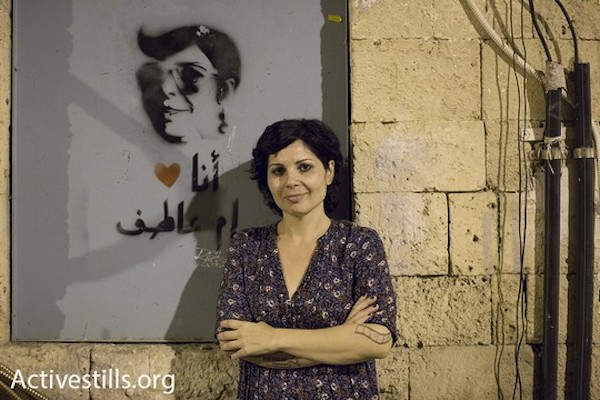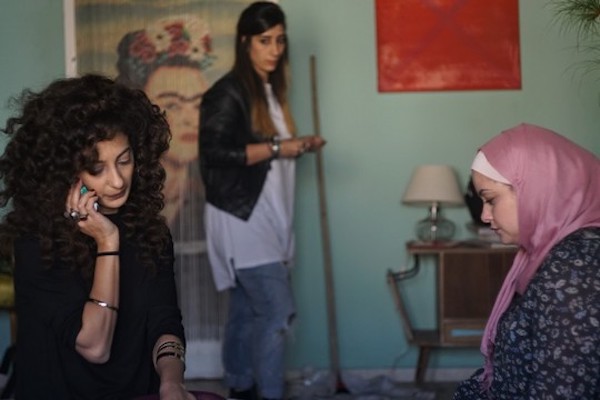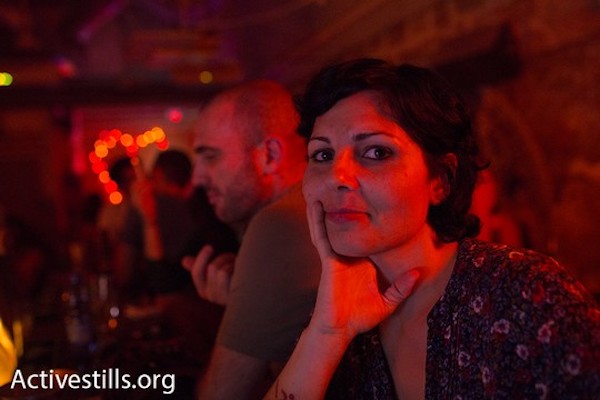Even as women continue to be underrepresented in the film industry, Palestinian director Maysaloun Hamoud’s new movie is winning international acclaim — and puts Palestinian women front and center. +972 Magazine sat down with Hamoud to talk feminism, liberation and Palestinian society.

One of the strongest sensations I experienced during my first viewing of “In Between” was the discomfort that accompanies the exposure of a secret. A personal, intimate secret, which several women dear to me have kept close to their chest for many years, and which has suddenly been revealed in full onscreen. And not just onscreen: the secret has gone to festivals across the world, collecting prizes, winning plaudits, covered widely in local and international media, and now playing in cinemas across Israel (and countless other countries around the globe). After spending years on end in the shadows, film director Maysaloun Hamoud one day appeared with her debut feature, and killed the secret.
“In Between” tells the stories of three young Palestinian women — Layla from Nazareth, Salma from Tarshiha, and Nour from Umm al-Fahm — who share an apartment in Tel Aviv’s Yemenite Quarter (“in Manshiyya, next to the Hassan Bek Mosque,” as one of them refers to it in the film). The plot follows the developing relationships between the girls, and in particular the clashes that characterize their lives: between conservatism and liberalism, between the village, family and the city, and a great deal between men and women.
It’s difficult to say any more about the plot without ruining the surprises that await the viewer. However, it is certainly possible to say that in a world full of cigarettes, drugs, alcohol, parties, guys, lesbian relationships and sex, each one of the girls needs to look over her shoulder constantly, to make sure that there aren’t any distant cousins in a Tel Aviv bar who will report back to the family where and with whom she has gone out.
I know these women, and this looking over the shoulder. Hamoud herself says that her family never learned of her city life, and that her father would often receive reports that she’d been seen drinking beer — reports she quickly denied. And now, everything is out in the open — an entire world that no one had previously spoken of or written about — certainly not explicitly.
“My parents saw it for the first time during the Haifa Film Festival, with me sitting next to them,” Hamoud says. When I ask if they knew beforehand how her life would appear, she laughs and replies: “I reckon they still haven’t made the connection. They saw the whole film, and were very proud of me. My father read every scrap of information about the film. I say in interviews that I am presenting my life and that of my generation, so it’s not as if he doesn’t know at all.”
Aren’t you afraid of exposing a secret that is not only yours? Do you not fear that there will be consequences for other women who want to go out in Tel Aviv? You’re actually coming to the family of every Palestinian student and saying to them that everything they’re afraid of in the big city is actually real, and even worse.
“Judging by the responses from Palestinian girls who have seen the film, at premieres and festivals, I don’t feel I have anything to worry about. It obviously exposes something, but I think that the trick of the movie, for the families and for the older generation is that after the initial shock of seeing [the girls’] lives at the beginning, the film starts to slowly reveal their own lives to them as well, which undoes the antagonism.
“It shows you how you respond to your children. I don’t know if it will cause any real change among conservative, patriarchal men, but if it does make a difference, so much the better. But first of all we need to put the cards on the table.”
‘We don’t need Jews for this’
It’s time for full disclosure: this is not the first occasion on which I’ve had a bizarre feeling of being exposed during a Maysaloun Hamoud movie. I’ve known Hamoud since 2008, when I somehow came to play a nude model in her first short movie, “Shadows of Light,” which she shot as a first-year film student. Very quickly my nude image — which was originally only supposed to be shown to Hamoud’s art school friends — was starring in international student film festivals, as well as underground screenings in Tel Aviv.
After I’d forgiven her for the unexpected exposure, we became friends within the radical Jewish-Arab community that was brewing at the time, primarily in and around the Anna Loulou bar in Jaffa.
“It’s not just the movie’s opening scene that is set in Anna Loulou,” Hamoud told me during the first part of this interview, which took place in the bar itself. “The movie takes place in Tel Aviv, because I wanted the imagery to be within a hegemonic space, but the scene in which they live is in Jaffa. The essence of the scene is Jaffa-Tel Aviv, and the plot-lines draw a lot of inspiration from what happens around me and from real characters in my own life.”

Is Tel Aviv the condition for freedom? Could this happen elsewhere, or is the Jewish hegemony in which the story is set needed for the girls’ feminist liberation?
“Tel Aviv is a city, and that’s what a city does. It challenges. The same things would likely happen in Beirut or Amman. So probably not — we don’t need Jews for this. Tel Aviv is not the Berlin of the Middle East. It’s just the city that’s here. The scene here is unique because it’s Jewish-Arab, with a lot of mutual influence. Most young Palestinians in the city believe in a shared life, while the Jews [in this particular community] are left-wing and anti-Zionist, which is like a glue that creates mixed couples.”
The difference between religion and the religious
Hamoud, 35, was born to communist parents. Her father was studying medicine in Hungary at the time. She grew up and spent her adolescent years in Be’er Sheva, went to study in Jerusalem, and from there moved to Jaffa to study cinema at the Minshar School of Art.
She grew up on the writings of Emile Habibi and Karl Marx, on local and global culture, on May 1 demonstrations, and on the visual art of cartoonist Naji al-Ali.
When she tries to describe her generation, which is at the heart of the Palestinian underground scene in Israel and the center of “In Between,” Hamoud relies on two central historical events. This is the generation that was politicized by October 2000 and the Second Intifada, swept up not only on a national level but also on the social and feminist fronts. At the same time, it’s the generation that finally came of age in the Arab Spring of 2011, and in its ambivalence towards the local incarnation of those events, the summer 2011 social protests.
“The atmosphere of the Arab Spring didn’t skip Palestine/Israel, we were all with them in spirit — in the opposition to oppression, patriarchy, chauvinism and the perpetuation of the old system. This generation can no longer continue playing around with obsolete codes. We have to put everything on the table, because as long as we keep sweeping our fears under the carpet, the carpet will rise and we will stumble. Fundamentalism is a serious disease, and if we don’t shake out the carpet it’s likely going to be too late.”
Now that the film has been commercially released, what response are you expecting to these sentiments, which are also at the heart of the movie?
“Some people will want to hang us in the town square, for sure. The conservatives. The film does something very clever: I don’t say a single bad thing about religion. Everyone has his own faith. That’s not what the religious say, but even among them there are no ‘bad guys.’ There are characters you fall in love with in conservative society as well. Nour wears a hijab, she isn’t leaving the faith. Yes, she’s searching for a place of liberation in her own world — the religious, believing world — and that’s the place I’m searching for. So I’m very curious as to what the religious will pick up from the film.
“The film doesn’t let liberals off the hook. It holds up a mirror to them too. We all know those families, Christian or Muslim, that are terribly open, but in moments of truth everyone falls in line behind the same traditions. It’s not just Nour’s family from Umm al-Fahm — it’s also that of Salma, the Christian. And the film doesn’t go easy on Jews, either. Maybe they’ll say, ‘Hey, it happens among us too, how great,’ but they need to address the fact that they always leave Arabs out. It’s a case of not here, not there. But the essence [of the film] is the intra-Palestinian conversation.”

Drugs and alcohol are a significant part of the film — marijuana, MDMA and more. What does that mean to you?
“First of all, during the first party in the film they’re taking Ritalin, and that’s intentional, because the parents watching the movie are themselves giving their kids Ritalin. Coke generates more antagonism, so I didn’t put an emphasis on it.
“But there’s more to say beyond that. We want to say that the current period is like the Sixties of the Arab world, and in an underground which you don’t want in the Middle East, everyone is taking every drug. It’s integral to the scene, and it influences identity, politics and culture. If we’re already doing it, why not show it?”
Balls in the face of BDS
“In Between” debuted at the Toronto International Film Festival last September, winning the International Asian Film Premiere award. It then went to the San Sebastian Film Festival in Spain, scooping up four prizes. It received a standing ovation from a full auditorium at the Haifa festival, before winning the prize for best debut feature film as well as a special artistic award for the three lead actresses (Shaden Kanboura, Sana Jammelieh and Mouna Hawa). Hamoud also went to Zagreb with the film, collecting a few more awards along the way. The movie has already screened in Spain, where it is high up in the box office charts, and is due for commercial release in other European countries, as well as the U.S., Canada, South Korea and more.
Success aside, “In Between” also sheds light on the complications of politics and identity faced by many Palestinian citizens of Israel who are film-makers. For example, Hamoud put together a soundtrack featuring original music by artists from different countries in the region, whose names she could not publish and who couldn’t be credited in the movie. The movie also features music by DAM, a Palestinian hip hop group from Lod, who wrote a dance song specially for the film. “They were amazing collaborators and I love them so much,” Hamoud says.
Other artists who saw earlier versions of the movie wanted to collaborate, but ultimately felt that their reputation would be in danger if they worked on a film funded by Israeli government institutions.
One day, Hamoud met a musician in Ramallah who was especially enthusiastic when he heard the movie’s plot and watched some of the rushes. “So I told him, yalla, we’ve put ourselves on the line for this movie, put yourselves on the line and say, ‘We’ll be the first people to look at the complexity, at the Palestinians who are inside [Israel – h.m.].’ But in the end they refused, despite knowing that they were contradicting themselves. There’s no link between the synchronization among us and the separation that reality has created.
“Yes, the state is giving me money, because I deserve to make films from the money I fucking pay [in taxes]. I’m not ashamed, and I deserve even more. And still, I would have taken money from elsewhere in order to lift the cloud of a boycott, but there’s nowhere else. So I took from the state, and the film will be screened as an Israeli-French movie, despite it being mostly Arab-Palestinian.”
Bitter candy
When I sat down with Hamoud again recently, I expected to find her slightly more relaxed, her film having taken on a life of its own after years of hard work. “I thought we’d release the film and then breathe a bit, but the universe had other plans,” she sighs. And so, alongside efforts to promote the film — which will continue to tour the globe until mid-2018 — the young writer-director will also be focusing on her next projects: a crime-comedy television series, another series, a documentary movie, the second movie in the “In Between” trilogy (which will continue following the life of one of the characters), and an additional feature film. In the midst of all that she is trying to spend time with her dog, Asal (“Honey”), who has been feeling a little left out recently.
In addition, Hamoud will be trying to use the immense exposure she has gained and the connections she has created in the film and media worlds in order to advance a group of writers, creators, speakers and others from the Palestinian underground scene. “People in the Israeli cinema world have never worked with the Arab community. They don’t know what it is. Arabs don’t go to the movies much, because there aren’t cinemas in their communities, they watch Hollywood films at home and there are no local movies they want to see. Now all of a sudden they have a reason to go out, and we need to make use of this swell in order to bring other people into the industry.”
But the most important thing of all for Hamoud is her dream that her movie will open up a “new era of representation of women in Palestinian cinema, in which the woman is at the center and not behind the male character,” she says.
“In most Palestinian movies the political story dominates the plot, and so [women] are generally represented as victims. Even in my early movies [filmed when she was a student – h.m.] I told women’s stories via men’s heroics. The women I want to show are all around us but are invisible in the movies. Gender, activism and liberation from the patriarchy can be feminist, even if that word doesn’t necessarily define the women themselves.
“One way of telling this complex story of women, and the weighty issues that accompany it, was to wrap the whole tale in simple cinematic language, almost American. It’s also the women’s internal language in the film. They are burdened by the outside world, but they see themselves in the same image we are accustomed to seeing in the cinematic output of a liberated and vibrant society. The film’s producer, Shlomi Elkabetz, calls this “bitter candy” — something wrapped in flamboyance and beauty. You get into the film, and then get kicked in the stomach.”
This article was originally published in Hebrew on Local Call. Read it here. Translated by Natasha Roth.


